
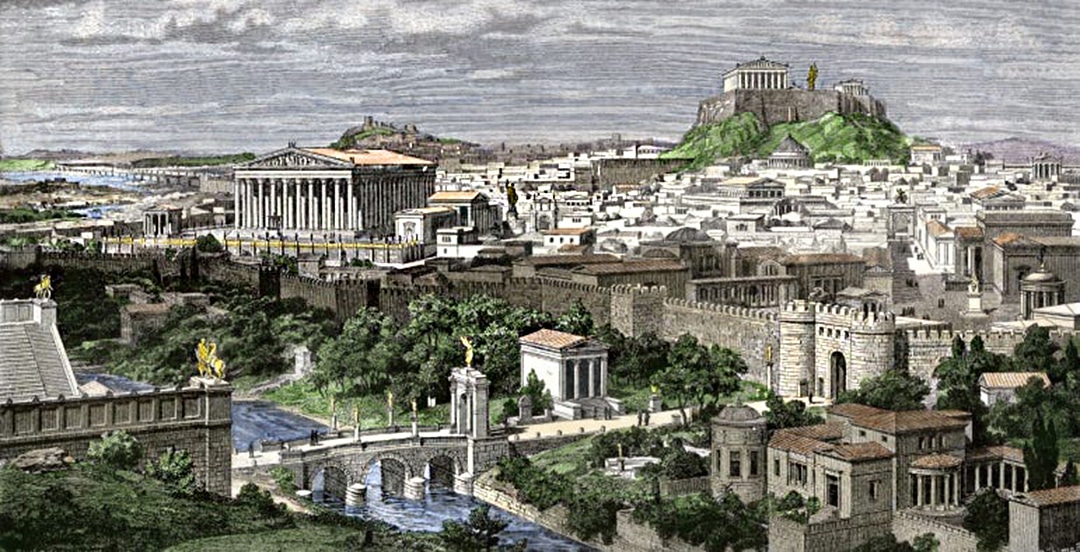
Good Cities, Good Citizens, Good People (Revolutionary Aristotelianism Part 3)
by W. D. James | Apr 17, 2024
A modern-day warrior
Mean, mean stride
Today’s Tom Sawyer
Mean, mean pride
Though his mind is not for rent
Don’t put him down as arrogant
His reserve a quiet defense
Riding out the day’s eventsi
– Rush, Tom Sawyer
Aristotle had begun his Politics with the assertion that human activity is aimed at what is at least perceived to be good. As that work develops, it becomes clear that Aristotle’s activity is itself an example of his principle: he is interested in uncovering what constitutes the good of cities, of citizens, and of people.
Good Cities
He sets out to create a basic typology of the possible forms of government or of how political societies may be constituted. We can imagine this in the form of a chart with two axes. The first axis is based on a strictly empirical observation: how many people rule: one, few, or many?
The other axis is the fundamental normative distinction between whether it is a good government or a bad government, or as Aristotle puts it, between a true or ideal rule on the one hand or a perverse rule on the other.
What is behind this moral distinction of ideal vs. perverse rule? As we saw in the previous essays, the life of a city is one of sharing or community. Further, the proper aim nature has prescribed for life in community is the ‘common good’. This is the basis of Aristotle’s moral distinction: true or ideal forms of government are those that are genuinely seeking the common good; perverse forms are those that seek only the good of those ruling, at the expense of the polity at large (hence they pervert the natural order of things).
We start to ‘fill in’ the typology by starting with the ‘perverse’ side of the normative axis: perverse rule by one is ‘tyranny,’ perverse rule by a few is ‘oligarchy,’ and perverse rule by many is ‘democracy.’
One person ruling in their interest at the cost of the whole is termed tyranny. Aristotle, observing the various polities of his world (but seems it would hold equally true of the polities of our world), held that the fundamental conflict in all polities was between the rich and the poor. Oligarchy is the few rich exploiting the rest of society. We might be a little shocked that Aristotle places democracy on the perverse side of the table. In his view though, this represents the many poor having attained supremacy in a polity and ruling in their class interests, which is also not the common good.
We can finish the picture by filling in the true or ideal forms of government. True rule by one person, in the interests of the whole, earns the title of ‘monarchy.’ Government by a few virtuous people in the common interest is an ‘aristocracy.’ What of this oddly named true rule of the many? Aristotle simply calls it ‘polity,’ or government, per se. It is different from the prior two true forms in that it does not rest primarily on the virtue of the rulers, though it will take care to instill virtue in the citizenry. It is a product of political art or skill. For Aristotle it is achieved by crafting the constitution so that the power of the few rich is balanced by the power of the many poor: both may still act in partisan fashion to achieve their class interests, but the constitution is balanced in such a way that the outcomes will balance their interests, producing good, common, results.
Any of the forms of government in the left column technically constitute ‘good government’ in that they succeed in pursuing the common good. Also, Aristotle does not think any one form of government is possible in all circumstances and also those circumstances will determine what form of government is called for. For instance, the ancient Spartans needed to reform their polity. It so happened that a very virtuous individual was at hand to govern for them, so they did well in asking Lycurgus to legislate for them. However, he does seem to think that polity is a flexible and versatile form of government that can be serviceable under many different sets of circumstances.
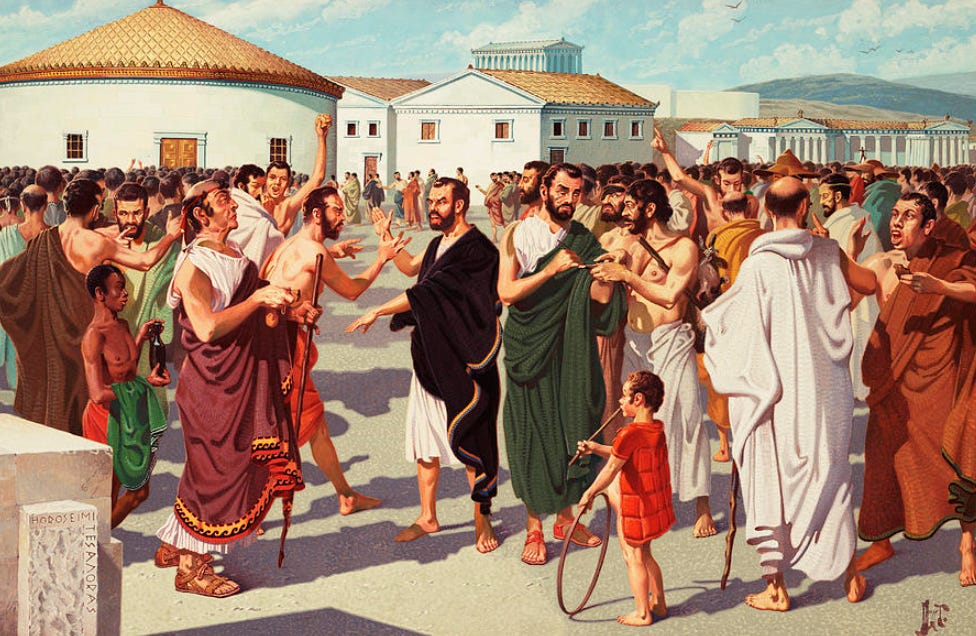
Good Citizens
Aristotle does not take the concept of ‘citizen’ lightly. He recognizes different polities will look on it differently and define who is a citizen more or less broadly. However, since government serves a role in helping us achieve good lives, one would need to actually participate in governance to fully receive all those goods. Hence, “The citizen in this strict sense is best defined by the one criterion that he shares in the administration of justice and in the holding of office.”ii
We start to see more why Aristotle saw the relatively small city-state as ideal. He holds that any sort of passive citizenship, citizenship that just consists in being ruled, is not adequate. He held that to become fully developed human beings, citizens needed to learn how to obey and how to rule. He felt age was a natural basis for this distinction. The young and inexperienced should learn to obey. It should be noted that this is not a submissive or oppressive obedience. They should learn to obey so that they might learn to rule. Children should obey their parents, students their teachers, etc… However, the role of the people on the top of those hierarchies is to equip the subordinate to take on their responsibilities and exercise authority in the future. Then, when they are older and have come into full intellectual and moral stature, they should rule: that is, they should participate in the administration of justice and the holding of offices.
It’s a participative view of citizenship. In administering justice, one develops one’s moral awareness: what is just and unjust, how to apply that to particular cases, what is the objective of punishment, how should goods be distributed in the community, how to distinguish between just and unjust wars? And one should take on the responsibilities of governing, of administering to the common good. One who does these things will grow in goodness according to Aristotle.
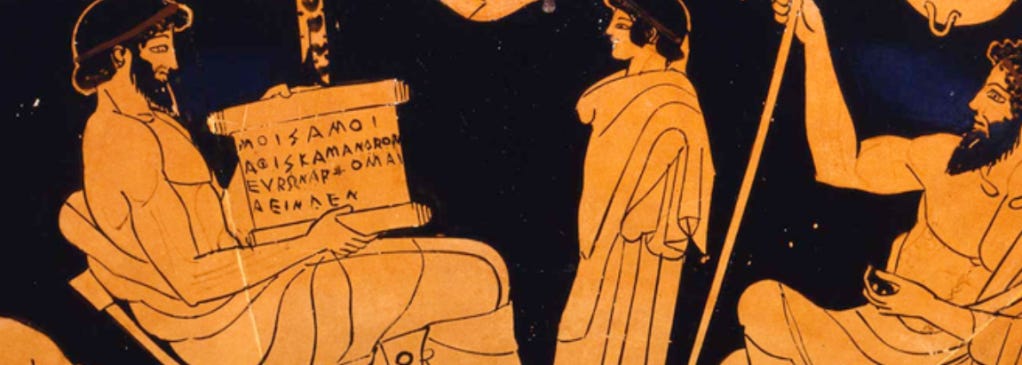
Good People
Good cities are good because they produce good and happy people. Aristotle, like most classical writers, pays a good deal of attention to the role and character of education in the maintenance of a good polity. It is worth noting that he is, as far as I am aware, the first proponent of public education: education at public expense. The broader the base of the citizenry the broader the number of people who need to be well educated. The city cannot afford to have its citizens govern poorly because they were too poor to afford an education.
But what counts as a good person? Aristotle observes: “Anyone who is going to make a proper inquiry about the best form of constitution [meaning the overall structure and institutions of a society, not particularly a written constitution] must first determine what mode of life is most to be desired.”iii In his account of his teacher Socrates’ trial, Plato (who was in turn Aristotle’s teacher) reported Socrates admonishing his jurors and fellow citizens that they made the mistake of valuing exterior things like wealth and prestige above the “care of your souls”. He said this was a case of putting the lower above the higher because the possession of a virtuous soul would help bring about external goods, while the possession of external goods does nothing to improve the virtue and health of the soul. A rich but foolish person is just a schmuck (Yiddish had not developed as a language by Socrates’ time, but if it had, I’m sure he would have made liberal use of Yiddish terms). Directly paralleling this, Aristotle states “You can see for yourselves that the goods of the soul are not gained or maintained by external goods. It is the other way around.”iv
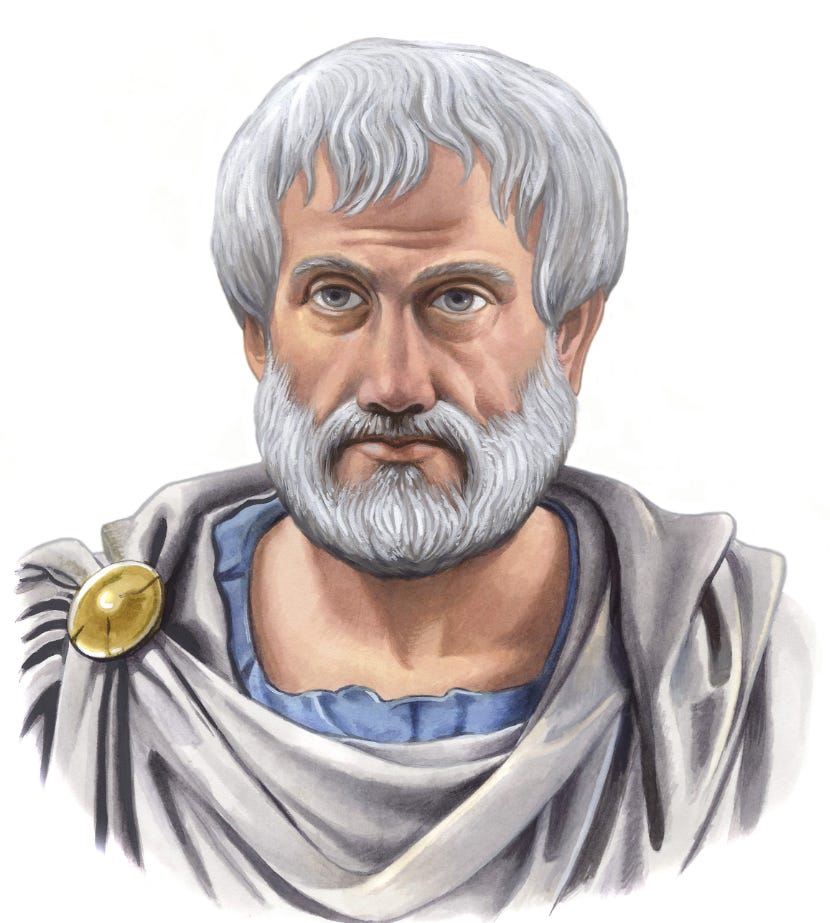
Aristotle deduces from this that the essential thing is to develop one’s character and soul. Of external things, one needs a sufficiency, but to continue to put effort into increasing external good is probably to shirk the internal. So, we want citizens to value the right things and strive for those. Aristotle believes, then, that the city should also follow the same set of priorities. Externals in this case would be things like acquiring colonies, military ventures, etc…. The city must make provision for these, it should not be a sheep amongst wolves, but there is a strict limit. It should instead focus on developing its internal goods like its culture and the development of citizens.
To do so, individually or socially, is, on Aristotle’s reckoning, to become god-like. Aristotle’s god is rather peculiar. He is certainly not a ‘personal god’ either in the sense of having a personality or of relating to humans (or anything else for that matter) on a personal level. He is the “unmoved mover” whom Aristotle feels compelled to deduce from the nature of nature. All things have a cause (or, well, four causes). So, if we were to hypothetically reason backward from all that is to what caused it, and then what caused that, and what caused that, we either end up with an infinite regress which makes no sense, or we have to say there was a first cause. Well, as any four-year-old would know, that provokes the question ‘what caused the first cause?’ Well, nothing because to be the first cause means there are no earlier causes. So, we have to have something that causes without itself having been caused: the “unmoved mover” (by which Aristotle means the uncaused causer).
He continues on: “God himself bears witness to this conclusion. He is happy and blessed, but he is so in and of himself, by reason of the nature of his being, and not by virtue of any external good.”v Why is that? We have to look rather closely. God, by definition, was not caused. God then is the first cause of all else that comes about. God could not have been in need of anything because he is self-sufficient. Being self-sufficient, he might then set about to act (create) or not. That ancient Greek wonder that there is something rather than nothing is pulsing through Aristotle’s mind here. God may well have just Been. But, as it turns out, God set things in motion; he Did. So, God must be happy and blessed because he lacks nothing; he is all he needs to be in and of himself. The externals, the stuff he set in motion, are not much of a concern to him: he does not need them.
Aristotle is suggesting that to become like this (to the extent we are capable of it) is the key to happiness. Focus on what you are more than on what you do or what you have. Be of such sure character that nothing much is going to ‘move’ you. We all know people more or less like this: they are legitimately self-assured. They know what they are made of because it has been tested. From this rock-like position, you may then set external things in motion. But they are not your ultimate concern.
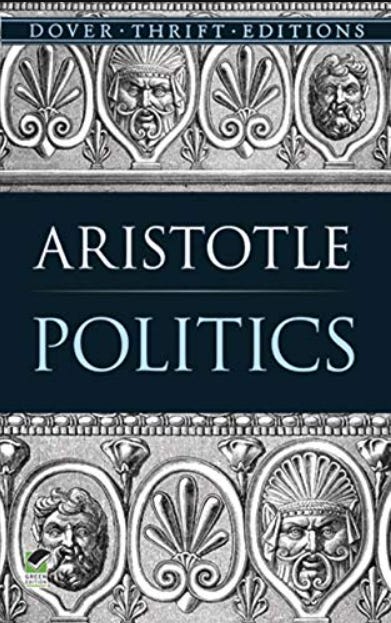
This is the distinction between the life of contemplation and the life of action. The life of contemplation, focusing on the interior, is superior. Hence, it is what the polis should aim at for its citizens. But, wait, that doesn’t quite work! Hadn’t Aristotle spent most of the Politics telling us how citizens, in their shared lives together working toward the good should be actively engaged in the administration of justice and the holding of offices? That’s ‘external’ stuff. The ‘life of action’ stuff.
Aristotle gets that there is an issue here. He admits: there is a difference between a good ‘man’ and a good ‘citizen.’ There may be a lot of overlap, but they are not one and the same. Well, what the heck are we supposed to do—aim for being good citizens or good people? Aristotle offers no easy answers. We must live together, that is our nature, so we cannot say it is not good to be a good citizen. However, we are each a person as well and must seek our good (not our individual self-interested good at the expense of the social good, but the real good of an at least quasi-spiritual existence). They are different.
I’m going to be extremely speculative here, but that has never stopped me before. We know from Plato that what he taught to his students at his Academy was not what he wrote in his written works. They are not textbooks for his students. All his actual teaching was in the form of verbal dialogue with the students and we have reason to believe the doctrines developed and taught there were not exactly identical to the teachings of his written works. Aristotle spent 20 years studying with Plato before he went and formed his own school, the Lyceum. Either he was very dense (20 years to complete college) or he was very thorough. My guess is that Plato taught a whole lot about the teachings of his teacher, Socrates, to his students—way more than is written down in any book by any author we still possess.
From the little we know of the historical Socrates from the writings of Plato (again, probably way less than Aristotle would have known), he seems like a great model of how to bridge this gap between the good citizen and the good person. I will briefly recount three stories about Socrates that Plato recounts for us.
We are told of Socrates’ life as a soldier. This was the epitome of citizenly duty. Socrates was apparently of middling economic status, as we know he was able to afford to outfit himself as a Greek hoplite. These were the heavily armed, well-disciplined infantry that was the backbone of any Greek fighting force. If you were rich, you would be in the cavalry so you didn’t have to walk so much. If you were poor, you’d end up rowing a galley (well, mostly slaves did that) or being the sort of infantry who were completely expendable and almost as useless.
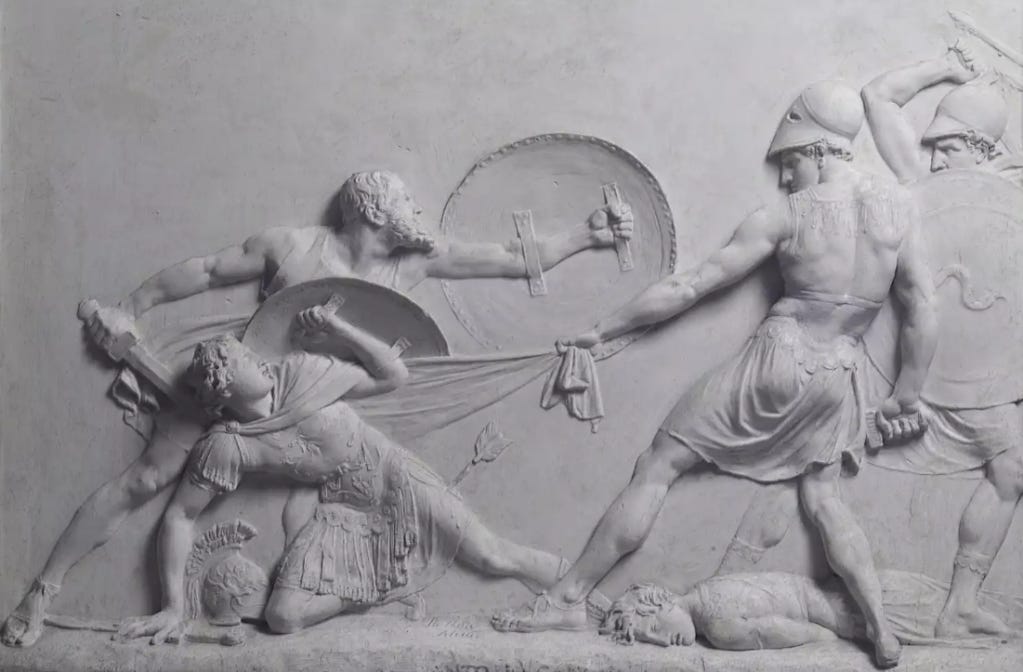
While on campaign, for instance, we know Socrates fought at the battle of Potidaea in the Peloponnesian war. Socrates was known as a good but weird soldier. We are told that he was very hardy, traveling barefoot and lightly cloaked, even in inclement weather. He was brave and did his duty. However, while on the march, he would sometimes stand motionless, lost in thought, for up to the better part of a day. That has the ring of self-possession first, then determined action when needed.
Secondly, Plato has Socrates tell us in his trial about how when he was ordered by the Thirty Tyrants (the hated quislings set up by Sparta to govern Athens after the latter’s defeat), when it was his term to hold office, to carry out a sentence which he felt was given contrary to the law, he refused. He just didn’t do it, at the risk of his own skin. In that case fate was on his side as the democracy was restored before the Tyrants could do much about it. Again, sort of a passive sticking to justice and the law at risk to oneself. Citizenship yes, but moral integrity (and even political integrity, as the orders were contrary to the law) first.
Thirdly, Socrates’s trial itself. Having been convicted by 500 jurors of his peers (that is what democracy looks like), he refuses to back down and ‘play the game’ when it comes to his sentencing (hence, he gets death). He will not betray genuine justice. He lectures his condemners for their own good (the speech about the goods of the soul referenced above). The good citizen as martyr to integrity.
I would suggest that in Aristotle’s mind, Socrates had navigated this gap between being the good citizen and the good man as well as it could be done. And yet, Athens killed its most valuable citizen. Ultimately, at the heart of political life is tragedy. The good of society and the good of individual human persons are not easily reconciled. The good person does their best as a citizen, but their ultimate loyalty lies higher. Wise cities would recognize the rightness of this. Very few existing cities are so wise.
Of Oligarchs and Good People
I think we know what it is to be governed by oligarchs. Aristotle helps us to understand where their perversity lies. Under such circumstances, the conditions for producing good citizens is not only limited, but actively undermined.
This is no light matter. We are political animals. To remove the opportunity for participative self-government is to damage our humanity. Yet, we may certainly strive to be good people living under a bad regime. To echo the lyrics of Rush with which we began, the good person’s reserve harbors a “quiet defense.” She may ride out the “day’s events” as Socrates rode out the times of the Thirty Tyrants. But this is clearly a non-ideal situation.
In following essays, we will turn to the thought of the contemporary Aristotelian thinker Alasdair MacIntyre. He will help us focus our critical insights on the effects of our modern disorders and will suggest how we might go about recapturing something of a good community life as well.

Subscribe to Philosopher’s Holler
i Alas, Rush was my first concert experience. A bit much Ayn Rand, but pretty solid tune: Rush – Tom Sawyer (Live Exit Stage Left Version) – YouTube
ii Aristotle, Politics, translated by Ernest Barker, Oxford University Press, 1998, p. 85.
iii Ibid, p. 251.
iv Ibid, p. 252.
v Ibid, p. 253.
This essay was first published on Winter Oak.


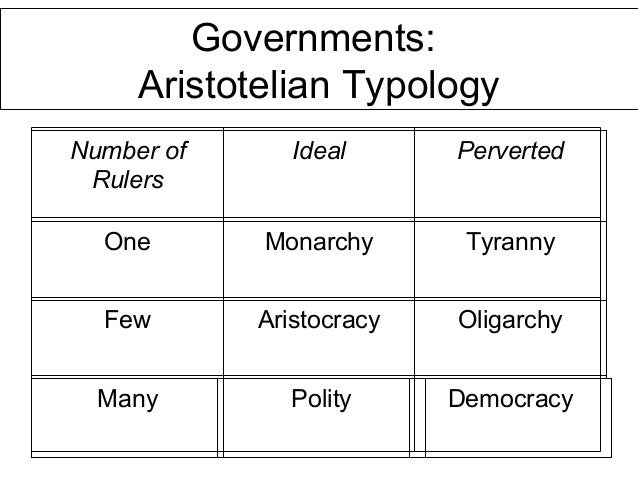

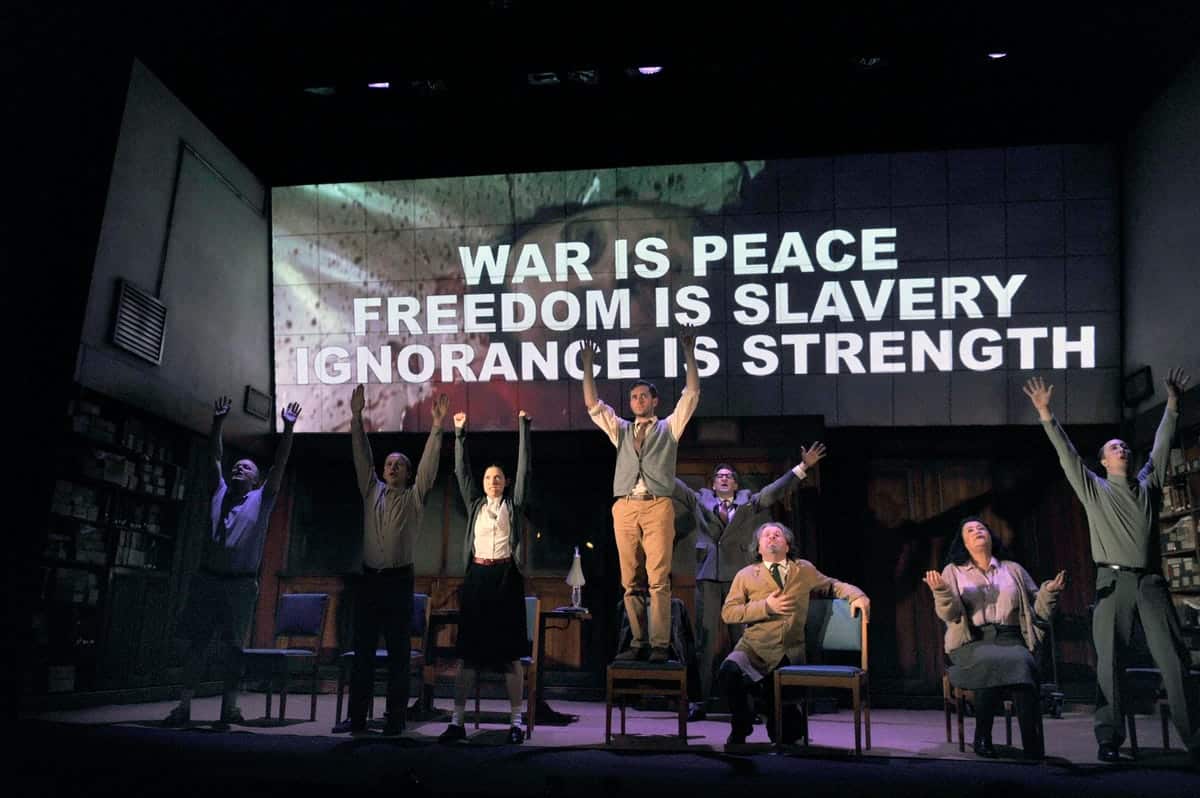
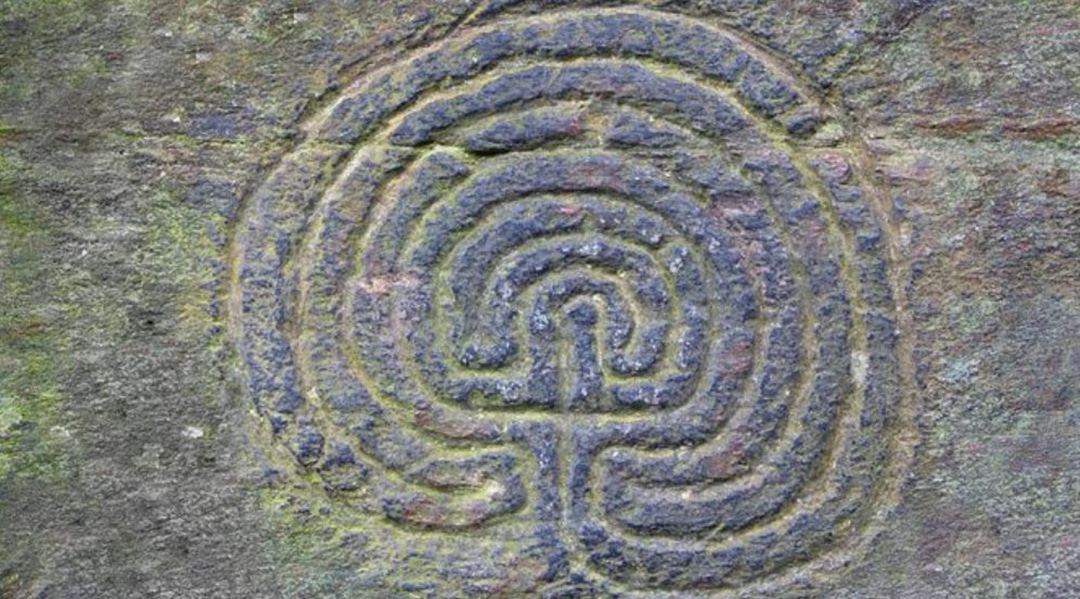
0 Comments